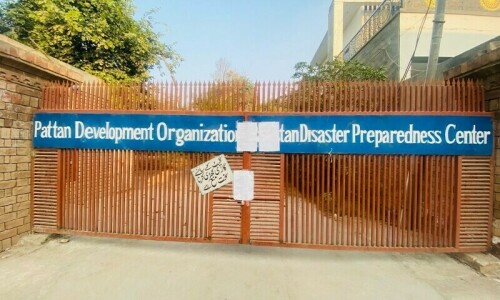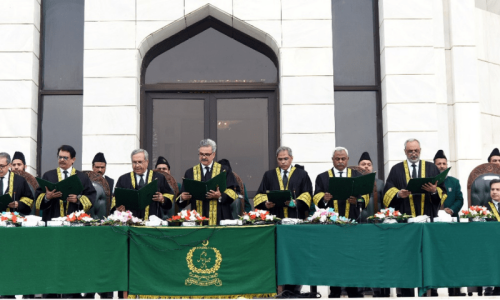
KARACHI: In the last week of November 2011, Qadeer Baloch, a retired UBL employee from Quetta did something that no grandfather should have to do. He held his four and a half year old grandson’s hand and took him to see his son Jalil Reki’s mutilated bullet-riddled body and made sure the kid got a good look at it. Qadeer Baloch also had a chat with the boy and told him who had killed his father and why.
For more than two and a half years Qadeer had been lying to the boy. “When Jalil was picked up he was only two,” says Qadeer Baloch. “He had a hole in his heart and the doctors told us not to put him under any stress. So I kept telling him that his daddy was away on business.”
Qadeer speaks in measured sentences, there is no bitterness or anger in his voice. His account of his son’s disappearance and death two years and nine months later is incredibly detailed. Every few minutes he produces a document, a newspaper clipping or an affidavit from a witness to prove his version of events.
Jalil Reki was the information secretary of Baloch Republican Party, a relatively new Baloch nationalist party that emerged after Nawab Akbar Khan Bugti’s Jamhoori Watan Party split into a number of factions after his murder. “Jalil was offered the post of Secretary General, but he was a bit bookish, so he chose to become the party’s information secretary.”
On February 13, 2009, they came for Jalil Reki in two pick-up trucks and two unregistered cars, FC men accompanied by intelligence officials in plain clothes. “His friends had warned him that he might be picked up but he was campaigning for his missing colleagues. He said if I run away who is going to write all the press releases? He was returning from Friday prayers, he saw them and tried to run but they threatened to shoot him and he surrendered.”
For the next two years and nine months Jalil Reki became a missing person. There are more than 8,000 if you believe Baloch nationalists, hundreds according to human rights organisations, 1,100 according to our interior minister Rehman Malik and none according to our intelligence agencies. Senior journalist I. A. Rehman wrote in these pages more than two years ago:
“Instead of offering the embittered Baloch redress and satisfaction the authorities have chosen to quibble over the number of missing....”
For Qadeer Baloch Jalil Reiki wasn’t a disputed statistic. He rallied other families and started an organisation called Voice of the Baloch Missing People. They camp outside the Quetta, Islamabad and Karachi press clubs sometimes for three months at a stretch. Journalists mostly ignore them. They sit behind rows of photos of their martyrs and the missing. In his picture Jalil Reki has a faint smile, a trimmed mustache and the deep eyes of someone who thinks a lot.
“I talked to him about his political activities. I knew what he was doing was dangerous. But he told me he wasn’t selling heroin or doing anything immoral.” Qadeer Baloch himself was politically active as a NAP member in the seventies and remembers the good old days when authorities booked you on false charges, arrested you, you tried to raise bail. “None of this stuff where a person just disappears from the face of this earth.”
In the years that Jalil was a missing person, he was able to talk to his family only once. “It was around Eid and all the officers were away. Some poor soldier took pity on him. We received a call on our landline and someone gave us a mobile number and said put one thousand rupees balance into this account and wait for the call. I went to two shops and put five hundred rupees twice into the phone account. I was worried that if I bought the balance from one shop, the call might not come. We received a call late in the night. He sounded confident. He said they had punished him a lot. I understood that he had been tortured. He said he had been kept in a dark room all by himself. His wife started to cry. Jalil told me not to beg anyone for his release. I was sure they’d let him go. Because killing him would serve no purpose. He would be battered, bruised and probably psychologically damaged, but he would be alive. That’s what I believed all along.”
Qadeer Baloch would hold on to this belief for another two years, right up to the moment when he saw his son’s body.
Meanwhile he kept getting reports of Jalil’s sightings from Baloch activists who were released after spending two to three years in the military-run dungeons. “They used to take turns giving azaan,” Qadeer says with a certain pride. “And after finishing the azaan, after saying la ilahha illallah they would announce their name as if it was a part of azaan, so that the other prisoners would know who you were and that you were still alive. They did it because if they ever got out they could tell your families that you were alive.”
Qadeer filed cases, turned up for hearings. “A colonel came up to me once. He said, we really feel bad for you, you are an old man, you look like a sharif admi.” Qadeer was courteous. “I said if you really feel bad for me, you should let my son go. And they reassured me that if my son was a political activist he would be released.” Qadeer believed them.
Then, two years and eight months after he was taken away, Jalil Reki stopped being a missing person. He became a dead person. A mutilated, shot-in-the-heart dead person.
“Someone saw a ticker on Vush channel. They didn’t have the heart to tell me so they just said can you switch on Vush channel, there is some news. There it was, my son’s name. It said his body had been found near Turbat.” Qadeer still didn’t believe it. “Why would they kill him after keeping him alive for almost three years?” But then he saw a picture in the daily Intikhab and was convinced. “The night you spend in the grave, you are not going to spend anywhere else. At least my son died a martyr, his name is part of history.”
A little later Qadeer received a call from the assistant commissioner of the area who said they’d arrange to have the body delivered. “I refused. I said leave him there. Your job was to take him away. Your job was to kill him. You have done your job. I can do the rest myself.”
Qadeer remembers the torture marks on his son’s body. He had a video made and kept it as evidence. He lists Jalil’s wounds without betraying emotion, as if remembering his son’s collection of books. “His left hand was like this,” he turns his own right hand into a limp fist. “Broken and swollen. His whole right arm had been burnt badly. His entire back was covered with clusters of tiny marks, not sure if they were cigarette burns. There were three bullets in and around his heart. Although he had been killed two or three days earlier, his body was fresh. Like a martyr’s.”
These days Qadeer Baloch, along with families of missing people, is camped in front of Karachi Press Club. The camp includes a 13-year-old girl whose father, a doctor, has been missing for three years. She refers to Qadeer as the ‘missing person uncle’.
The idea of setting up a camp in Karachi or Islamabad is to facilitate media access to these families. But the media generally ignores them. When was the last time mainstream newspapers or television channels showed a mutilated body of a young Baloch? The same TV crews which fall over each other to cover every little demonstration demanding the release of Pakistan’s most famous former missing person, Dr Aafia Siddiqi (who undoubtedly is a victim of similar state atrocities here and abroad) cannot be bothered to give any air time to these families.
Why did they kill Jalil? Qadeer thinks for a moment “While Jalil was in their custody, a few days before they killed him, there was an attack on a military checkpost in Chamalang where more than 30 soldiers and an army major was martyr….” Before he can complete the word ‘martyred’, Qadeer stops. “In which soldiers and an Army major were killed.” he corrects himself.
“They wanted revenge. It didn’t matter who had done it. It didn’t matter that when the attack happened Jalil had been in their custody for two years and nine months.” The FIR that he registered after Jalil’s disappearance names the ISI chief as the main accused.
It was before the funeral that Qadeer decided to take the four and a half year old with a hole in his heart to see his father’s body. “My friends and family tried to stop me. But I had been lying to the child. He would ask if daddy was away on business why did we have so many of his pictures around the house. I didn’t want him to grow up with the regret that I didn’t let him see his father one last time. So I took him and showed him his father’s body and told him everything.”
Qadeer has thought about his actions that day many times over but he doesn’t regret anything. “One of Jalil’s eyes was badly damaged and my grandson asked me who had done that to daddy. I said Pakistani agencies. And then he asked me who were Pakistani agencies. And I told him that too.”













































